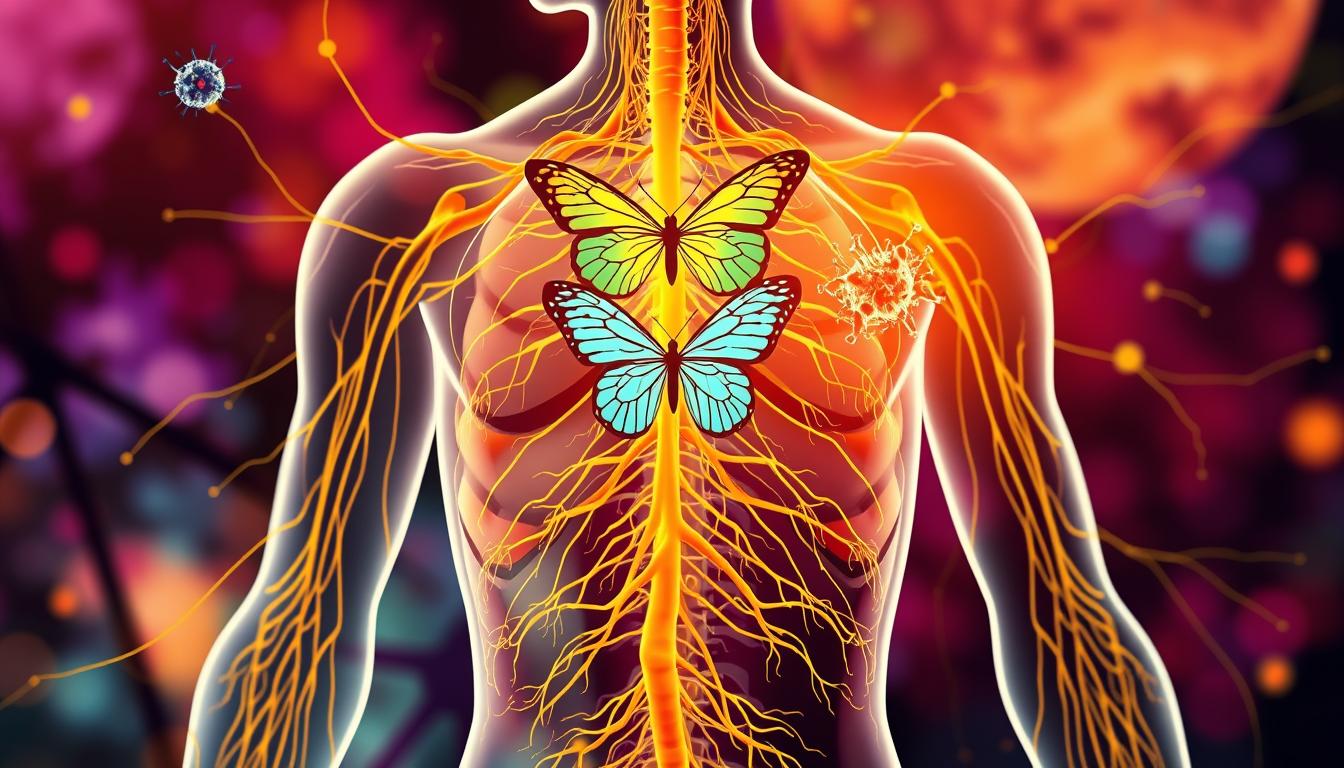Lupus and the Vagus Nerve: Some Key Insights
About half of all lupus patients face issues with their autonomic nervous system. This fact not only shows how common lupus is. It also shows how it’s linked to the nervous system. In Denmark, people with lupus live 25 years less than others. So, it’s key to understand the vagus nerve’s role.
The vagus nerve is crucial to the parasympathetic nervous system. It could help control lupus symptoms. Vagus nerve stimulation looks promising for treatment. It could help because over 80% of lupus patients suffer from extreme fatigue. This makes it hard for them to do everyday things.
This article explores how lupus and the vagus nerve are connected. By understanding this, we might find new ways to help those with lupus. It could improve their lives.
Have a look at our article on how pHix, our all natural supplement, helps activate the Vagus nerve which, in turn, can help those who suffer from Lupus. pHix Matured Hops Extract Activates the Vagus Nerve
Understanding Lupus as an Autoimmune Disease
Systemic lupus erythematosus (SLE) is a complex autoimmune disease. This condition surfaces when the immune system mistakenly attacks its own body. This attack leads to various symptoms that can affect the skin, joints, kidneys, and even the brain. Because its symptoms look like those of other diseases, it’s often called “the great imitator.”
SLE is known for its varied symptoms, which makes diagnosing and treating it tricky. Some SLE patients face autonomic dysfunction, with cases ranging from 6% to 93%. This shows how unpredictable lupus can be. Dealing with its complexity requires healthcare providers to customize treatment plans carefully.
Even with new treatments available, managing side effects is a big challenge. Most treatments depend on drugs like glucocorticoids, which can cause serious health issues. Though patients today have a better chance of surviving than in the past, their mortality risk remains 2 to 5 times higher than those without SLE.
Lupus affects more than just health. It brings financial stress, especially during severe episodes or when kidneys are affected. Understanding SLE is important not just medically, but economically too. Considering its wide-ranging impact is key to supporting those affected.
For more information on lupus and its effects on the nervous system, check out this resource.
| Aspect | Detail |
|---|---|
| Definition | A chronic autoimmune disease where the immune system attacks its own tissues. |
| Symptoms | Diverse, affecting skin, joints, kidneys, and nervous system. |
| Mortality Rate | 10% within 10 years; improved from 50% in the 1960s. |
| Economic Burden | Increased costs due to severe flares and organ damage. |
| Autonomic Dysfunction Prevalence | Ranges from 6% to 93% in SLE patients. |
| Treatment Risks | Includes adverse effects from glucocorticoids and immunosuppressants. |
Key Symptoms of Systemic Lupus Erythematosus
Systemic lupus erythematosus (SLE) comes with many symptoms. Fatigue is a common one, affecting up to 90% of those with SLE. This isn’t just being a little tired. It can make even simple tasks feel overwhelming. It wears down both your body and mind.
Many with lupus also feel musculoskeletal pain. This includes joint pain, stiffness, and swelling. It affects up to 70% of patients, making every move painful. Movement becomes a challenge. Other frequent symptoms are:
- Fever
- Skin rashes
- Neuropsychiatric complications
Neuropsychiatric issues complicate lupus diagnosis. About 50% to 60% may experience depression. Headaches are also common, affecting about half of those diagnosed. Cognitive problems, like mild forgetfulness to severe impairments, affect 30% to 50% of patients.
The unpredictability of lupus symptoms is a major hurdle. This variability makes treatment challenging. It highlights the need for personalized care. Understanding these symptoms can improve life for those with lupus.
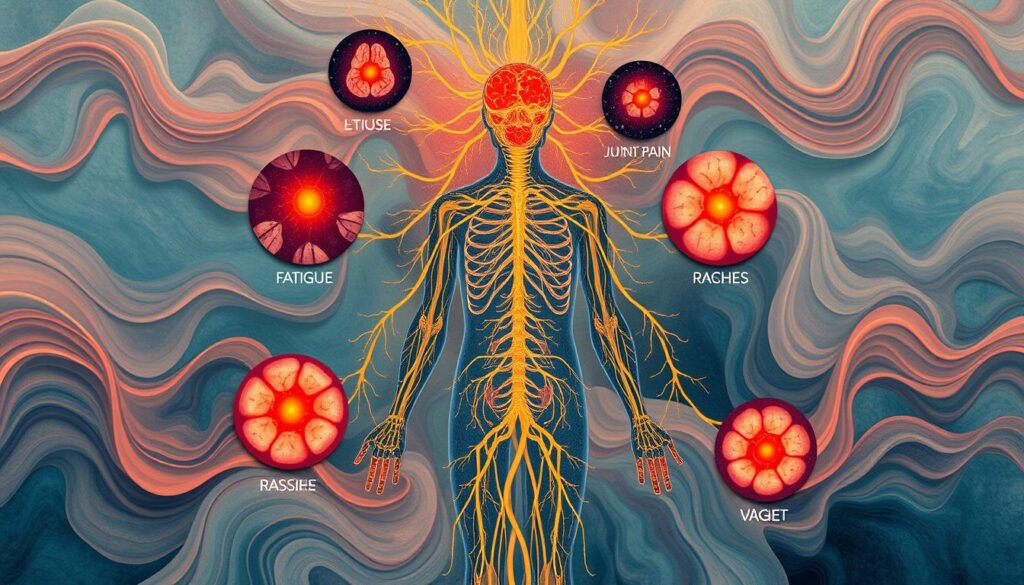
The Role of the Immune System in Lupus
The immune system is vital in how lupus happens. In lupus, the body’s defense against disease goes wrong. This leads to an unwanted attack on the body’s own cells.
Up to 95% of lupus patients deal with pain and fatigue. This is because of problems related to the immune system. Joint pain and swelling are common symptoms. Knowing about these issues helps in finding the right treatments.
A study showed lupus patients felt better after nerve stimulation treatments. They had less pain and fatigue. This was after just four sessions, showing how the nervous system can influence lupus.

- Abnormal immune responses can lead to a cycle of inflammation and damage.
- Studies show that targeting immune irregularities may help alleviate symptoms.
- Understanding the immune system’s role in lupus contributes significantly to therapeutic development.
Understanding how the immune system works and fails in lupus is crucial. It guides us to better treatments that target the disease correctly.
Nervous System Health and Autoimmune Conditions
The link between our nervous system and autoimmune diseases is fascinating. Patients with diseases like systemic lupus erythematosus (SLE) often face issues related to their nervous system. This is because the autonomic nervous system (ANS) plays a crucial role in controlling our immunity.
People with autoimmune diseases usually deal with autonomic dysfunction. This leads to more inflammation and a higher risk of heart problems. Diseases such as rheumatoid arthritis (RA) and systemic sclerosis (SSc) show similar issues. This dysfunction makes symptoms like fatigue and pain worse, pushing doctors to look beyond traditional treatments.
How does autonomic dysfunction change our immune response? Well, certain neurotransmitters can stop the production of harmful cytokines. This helps control inflammation, showing how vital our nervous system is.
Research shows that stimulating the vagus nerve can cut down cytokine production in macrophages. This suggests that focusing on the nervous system could help fight inflammation better. The connection between the autonomic nervous system and emphasizes the need for new treatments that look at both neurological and immunological aspects.

| Factor | Impact on Autoimmune Diseases | Role of Nervous System |
|---|---|---|
| Autonomic Dysfunction | Increased inflammation, symptoms of fatigue and pain | Regulates both innate and adaptive immunity |
| Norepinephrine | Inhibits pro-inflammatory cytokines | Critical regulator of immune cell function |
| Vagal Stimulation | Reduces cytokine production | Potential therapeutic strategy |
| Gut Health | 80% of the immune system resides in the gut | Vital for immunological memory |
Lupus and the Vagus Nerve
The relationship between the vagus nerve and lupus is very interesting. The vagus nerve is vital in our autonomic nervous system. It manages our body’s inflammatory responses. For people with lupus, this link can help find new treatments.
Exploring the Connection between Vagus Nerve and Lupus
Studies reveal that the vagus nerve can control the immune system. It might protect against lupus inflammation. Experiments show that activating the vagus nerve externally can reduce lupus symptoms.
In a study with 18 people having lupus pain, transcutaneous auricular vagus nerve stimulation (taVNS) lowered their pain by 5 points. This method could better the lives of those with lupus.
Impact of Vagus Nerve Dysfunction on Inflammation
However, if the vagus nerve works poorly, lupus inflammation can worsen. This can make symptoms more severe and active. But, the same study showed that taVNS effectively reduces pain.
This reduction was significantly better than in those who received fake stimulation. With further research, tVNS could become a key lupus treatment. Understanding this could change how we treat this condition in the future.
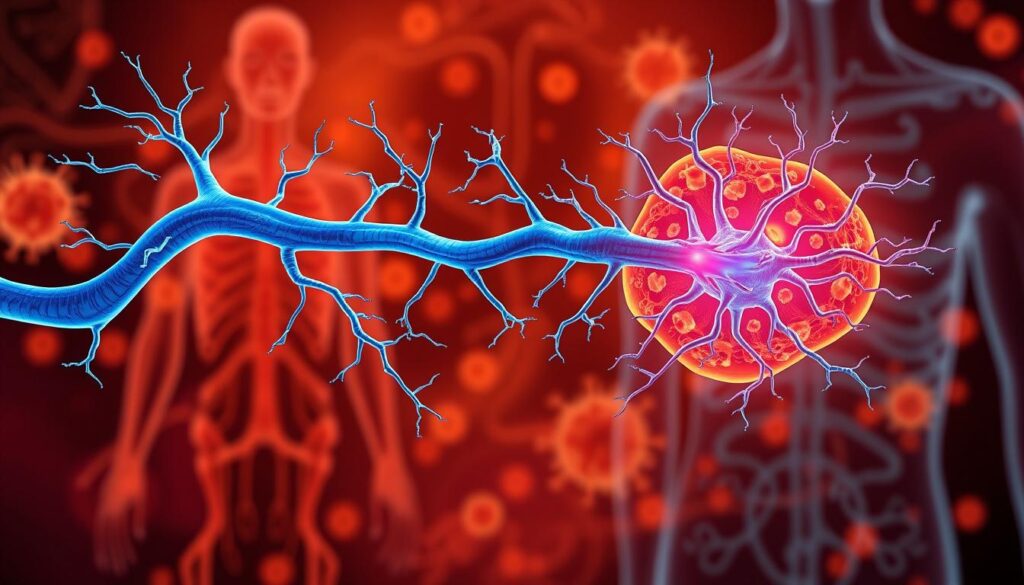
Chronic Illness and Autonomic Dysfunction
Dealing with chronic illness is like being on a rollercoaster you didn’t choose to ride. For those with systemic lupus erythematosus (SLE), the journey includes a battle against autonomic dysfunction. This problem can cause heart rates and blood pressure to change wildly, making life unpredictable.
The number of SLE patients facing autonomic dysfunction is shocking. It ranges from 6% to an astounding 93%. Around 24.1% have cardiovascular autonomic neuropathy (CAN), compared to only 1.9% of healthy people. These symptoms can disrupt both the body and mind, complicating chronic illness management.
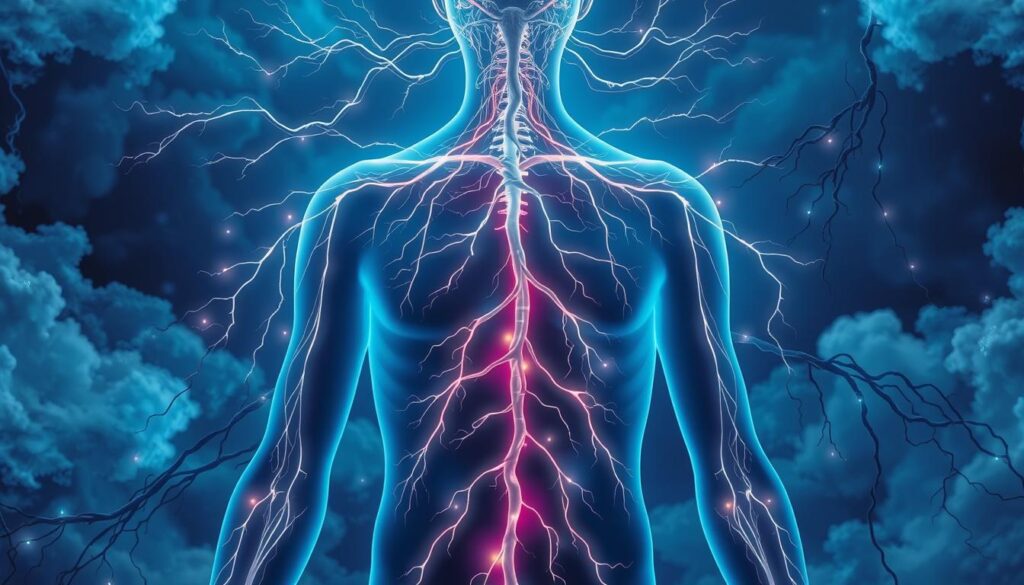
For those with SLE, feelings of fatigue often add to their troubles. A study with 64 SLE patients found a link between autonomic dysfunction and low energy levels. This makes treating their condition even harder.
- Increased risks of comorbidities and organ damage.
- Low quality of life and work incapacity.
- Heightened mortality rates, with a current 10% mortality rate within ten years.
These issues highlight the need for treatments that address autonomic dysfunction. Right now, doctors often prescribe antimalarials and immunosuppressants, but these can be risky. However, there is hope. Research into new treatments like vagus nerve stimulation shows promise. This could make a big difference for those fighting SLE and its complications.
The Importance of Inflammation Management in Lupus
Managing lupus means focusing on inflammation control. Inflammation is a major factor in the disease’s progression and its severity. Knowing about specific inflammation markers helps to check how well treatments are working. This lets doctors design treatment strategies that fit each patient’s needs, which may lead to improved health.
Many people with lupus deal with symptoms from systemic inflammation. Recognizing and treating these early can change the disease’s impact. Chronic inflammation is behind many serious health problems. That makes it crucial in care plans for lupus. Some studies suggest using the cholinergic anti-inflammatory pathway to lower inflammation. This method, involving elements like nicotine, can help with inflammation and symptoms in conditions like rheumatoid arthritis.
For lupus patients, keeping inflammation at a good level can help avoid complications. Using precise treatments helps with symptom relief and protects organs from damage over time. Tailored care plans need a thorough look at what’s causing each patient’s inflammation. This approach aims to improve life quality for those living with lupus.
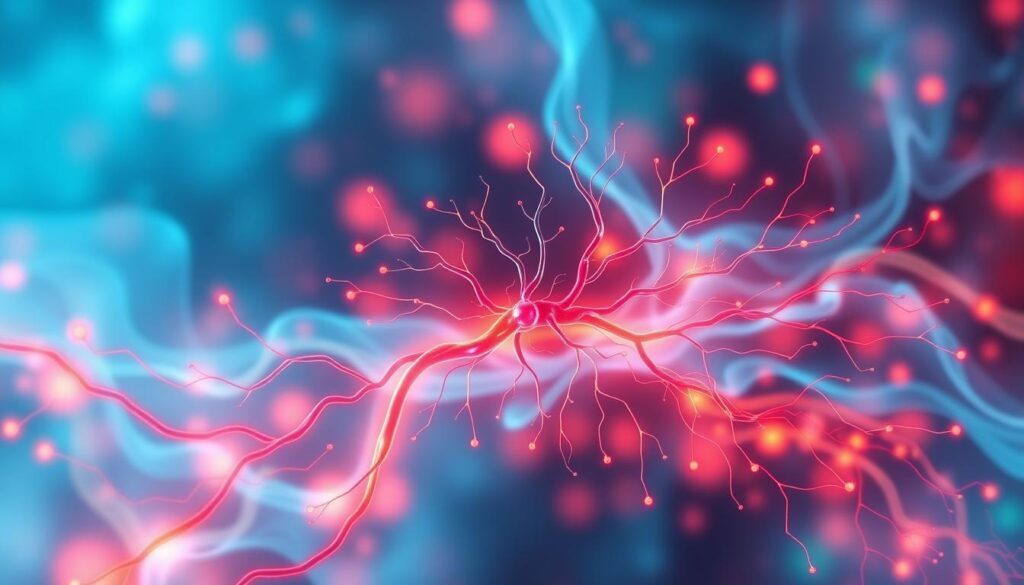
Research Findings on Vagus Nerve Stimulation for Lupus
Lupus affects about 5 million people all over the world. This shows there’s a big need for new ways to treat it. Vagus nerve stimulation (VNS) looks promising for helping with lupus. Research findings show it might lessen symptoms like fatigue and muscle pain. These symptoms affect up to 95% of those with lupus.
A key study, called the SLE-VNS, looked at a small group. It had 12 people get real VNS and 6 get a fake version. They all had stimulation for 5 minutes each day for four days. Those with real VNS felt less pain and tiredness by the fifth day. Their improvement stood out by the twelfth day compared to the fake group.
VNS research also touches on how it works. Studies in animals showed it can change the heart rate for up to four weeks. It can lower TNF levels when the body reacts strongly to infection. These results highlight how VNS might help control body-wide inflammation. This is especially important for fighting chronic diseases like lupus.
VNS technology isn’t new. It’s been used for epilepsy and depression already. We’ve known about the vagus nerve’s importance for over a hundred years. Even though it’s tough to study VNS in small animals, new surgical methods are helping. These advances allow for better research. They help us understand how VNS could fight autoimmune diseases better.
| Study Aspect | Details |
|---|---|
| Global Lupus Affected | 5 million |
| Chronic Pain in Lupus | Up to 95% |
| Participants in SLE-VNS Study | 12 stim, 6 sham |
| Stimulation Duration | 5 minutes/day, 4 days |
| Pain and Fatigue Improvement | Significant by day 5 and day 12 |
| Heart Rate Response Duration | At least 4 weeks in 60-90% of mice |
| TNF Level Suppression | Significantly during endotoxemia |
| VNS Clinical Device Applications | Epilepsy and depression |
| Research History | Over 100 years |

Holistic Treatment Approaches for Lupus Patients
Lupus management benefits from many holistic treatment options that focus on the whole person. These integrative therapies aim to reduce symptoms and boost well-being. By using personalized treatment plans, patients often see better health.
Benefits of Integrative Therapies
Integrative therapies include dietary changes, physical therapy, mindfulness, and stress management. They help with lupus by treating both body and mind. Here are some key benefits:
- Improved Symptom Management: Participants often report fewer flare-ups and milder symptoms.
- Increased Quality of Life: Engaging in holistic practices can improve emotional and mental health.
- Enhanced Patient Agency: Patients play an active role in their health with lifestyle changes.
- Support for Conventional Medicine: Integrative therapies can aid traditional treatments, possibly leading to better outcomes.
Potential of Transcutaneous Vagus Nerve Stimulation
Transcutaneous vagus nerve stimulation (tVNS) is becoming a promising lupus therapy. It’s safe compared to traditional medicines and can be done at home. It shows promise in reducing lupus-related inflammation.
Studies on tVNS show many health benefits for lupus patients. For instance:
- Reduced Disease Activity: There’s a drop in lupus disease activity levels.
- Lowered Inflammation: Heart rate changes relate to less inflammation, like lower IL-6.
- Enhanced Autonomic Function: There are improvements in the nervous system’s activity in lupus patients.

With ongoing research, tVNS looks more promising as a holistic lupus treatment. Current studies and stories from patients suggest a new way to manage lupus with comprehensive, integrative strategies.
Neurological Connections in Autoimmune Disease
Autoimmune diseases like lupus show us how the brain and inflammation are connected. Studies show that the autonomic nervous system (ANS) plays a key role. It affects how diseases such as systemic lupus erythematosus (SLE) start and progress.
Research found that norepinephrine, a special kind of chemical, is vital. It helps control inflammation by blocking certain harmful proteins. This shows how our body’s stress response can help fight autoimmune diseases.
The vagus nerve also has an important part to play. When it releases acetylcholine, inflammation is reduced. This suggests that treating the nervous system could help manage autoimmune diseases better.
New research is looking into how bioelectronic medicine can help. For example, stimulating the vagus nerve could reduce lupus symptoms like pain and fatigue. Studies led by Dr. Cynthia Aranow are testing these treatments over time.
Learning more about how our nervous system interacts with autoimmune diseases may lead to new treatments. These could help reduce chronic inflammation and make life better for patients.
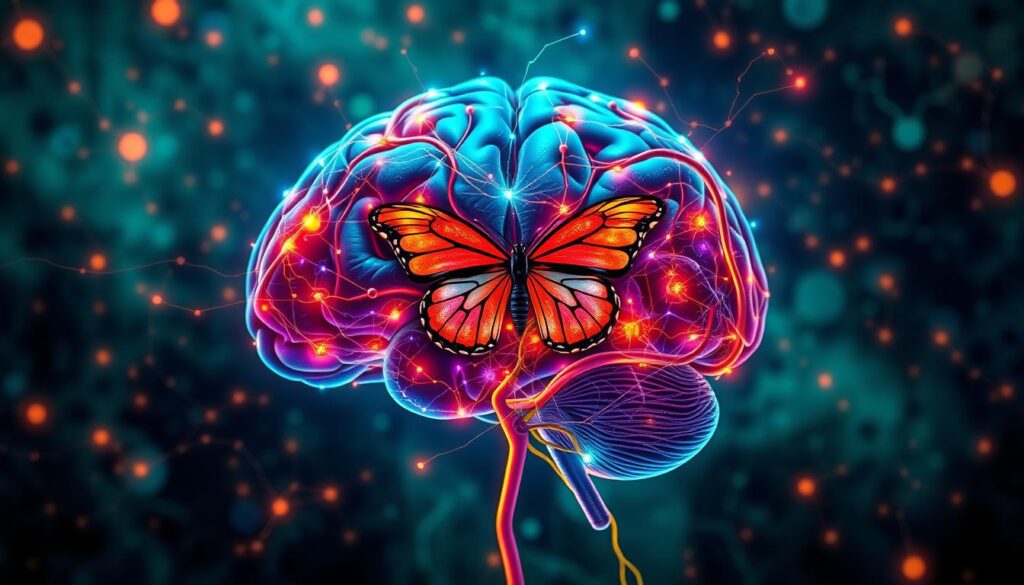
| Aspect | Details |
|---|---|
| Interrelation | Autonomic nervous system and immune system influence each other |
| Catecholamines | Norepinephrine inhibits pro-inflammatory cytokines |
| Vagus nerve’s role | Release of acetylcholine has anti-inflammatory effects |
| Ongoing research | Vagus nerve stimulation trials for lupus symptom relief |
| Potential benefits | Improvement in pain and fatigue levels |
Future Directions in Lupus Research and Treatment
Lupus research is full of potential, with a keen focus on the vagus nerve. The role of this nerve could be key in finding new ways to treat autoimmune diseases. Studies show stimulating the vagus nerve might help reduce symptoms and control inflammation in lupus.
Scientists are exploring treatments tailored to each patient. They’re looking at using wearable devices to track lupus effects. This could lead to treatments that are more specific and helpful for individuals with lupus.
There’s a lot of work being done to improve care for lupus patients, beyond just new treatments. Things like diet changes and cognitive-behavioral strategies might also play a part in managing lupus better. By combining new research with a focus on patient needs, lupus care is moving forward.
Interested in how the Vagus Nerve impacts treatment? Check out this research article for more information on its use in medicine.
Source Links
- Vagus nerve stimulation as a novel treatment for systemic lupus erythematous: study protocol for a randomised, parallel-group, sham-controlled investigator-initiated clinical trial, the SLE-VNS study – https://pmc.ncbi.nlm.nih.gov/articles/PMC9490576/
- Optimizing Noninvasive Vagus Nerve Stimulation for Systemic Lupus Erythematosus: Protocol for a Multicenter Randomized Controlled Trial – https://pmc.ncbi.nlm.nih.gov/articles/PMC10612000/
- Vagus nerve stimulation as a novel treatment for systemic lupus erythematous: study protocol for a randomised, parallel-group, sham-controlled investigator-initiated clinical trial, the SLE-VNS study – https://bmjopen.bmj.com/content/12/9/e064552.abstract
- Overview of therapeutic applications of non-invasive vagus nerve stimulation: a motivation for novel treatments for systemic lupus erythematosus – Bioelectronic Medicine – https://bioelecmed.biomedcentral.com/articles/10.1186/s42234-021-00069-5
- How Lupus Affects the Nervous System : Johns Hopkins – https://www.hopkinslupus.org/lupus-info/lupus-affects-body/lupus-nervous-system/
- Neuropsychiatric Symptoms in Lupus – PMC – https://pmc.ncbi.nlm.nih.gov/articles/PMC4302271/
- Optimizing Noninvasive Vagus Nerve Stimulation for Systemic Lupus Erythematosus: Protocol for a Multicenter Randomized Controlled Trial – https://www.researchprotocols.org/2023/1/e48387/
- LuCIN Investigators Show that Stimulating the Vagus Nerve in Lupus Patients Decreases Pain and Fatigue – https://www.lupusresearch.org/lucin-investigators-show-that-stimulating-the-vagus-nerve-in-lupus-patients-decreases-pain-and-fatigue/
- Vagus Nerve Stimulation Wanders into Mainstream Rheumatology – https://www.healio.com/news/rheumatology/20191015/vagus-nerve-stimulation-wanders-into-mainstream-rheumatology
- Vagus nerve activation of the spleen shows promise to treat infections, Feinstein Institutes research – https://www.biospace.com/vagus-nerve-activation-of-the-spleen-shows-promise-to-treat-infections-feinstein-institutes-research
- The Interplay between Autonomic Nervous System and Inflammation across Systemic Autoimmune Diseases – https://pmc.ncbi.nlm.nih.gov/articles/PMC8910153/
- Implications of the Vagus Nerve and Immune System Connection for Inflammation, Autoimmune Diseases & Mental Health – Personalized Lifestyle Medicine Institute – https://plminstitute.org/plmi-blog/implications-of-the-vagus-nerve-and-immune-system-connection-for-inflammation-autoimmune-diseases-mental-health/
- Transcutaneous auricular vagus nerve stimulation reduces pain and fatigue in patients with systemic lupus erythematosus: a randomised, double-blind, sham-controlled pilot trial – https://ard.bmj.com/content/80/2/203
- Nerve Stimulation Reduces Pain, Fatigue from Lupus | Science and Enterprise – https://technewslit.com/sciencebusiness/?p=34904
- Lupus-related Study Looks at New Way to Measure Nerve Signals – https://lupusnewstoday.com/news/lupus-related-study-new-way-to-measure-nerve-signaling/
- AB1036 VAGUS NERVE STIMULATION AS A NOVEL TREATMENT OF FATIGUE IN PATIENTS WITH SYSTEMIC LUPUS ERYTHEMATOSUS: A RANDOMIZED, DOUBLE-BLINDED, SHAM-CONTROLLED, CLINICAL TRIAL – https://ard.bmj.com/content/83/Suppl_1/1839.1
- Characteristics of cardiovascular autonomic dysfunction and association with quality of life in patients with systemic lupus erythematosus – https://lupus.bmj.com/content/8/1/e000507
- Can vagus nerve stimulation halt or ameliorate rheumatoid arthritis and lupus? – Lipids in Health and Disease – https://lipidworld.biomedcentral.com/articles/10.1186/1476-511X-10-19
- Frontiers | Non-invasive vagus nerve stimulation in anti-inflammatory therapy: mechanistic insights and future perspectives – https://www.frontiersin.org/journals/neuroscience/articles/10.3389/fnins.2024.1490300/full
- Bioelectronic medicine treatment effective for lupus, pilot clinical trial shows – https://www.biospace.com/bioelectronic-medicine-treatment-effective-for-lupus-pilot-clinical-trial-shows
- Development and characterization of a chronic implant mouse model for vagus nerve stimulation – https://elifesciences.org/articles/61270
- Microsoft Word – TRUST Protocol v7-29-16.docx – https://cdn.clinicaltrials.gov/large-docs/65/NCT02917265/Prot_SAP_001.pdf
- The Interplay between Autonomic Nervous System and Inflammation across Systemic Autoimmune Diseases – https://www.mdpi.com/1422-0067/23/5/2449
- Feinstein Institutes awarded Lupus Research Alliance funding for vagus nerve stimulation clinical trial – https://www.biospace.com/press-releases/feinstein-institutes-awarded-lupus-research-alliance-funding-for-vagus-nerve-stimulation-clinical-trial
- The gateway reflex regulates tissue-specific autoimmune diseases – Inflammation and Regeneration – https://inflammregen.biomedcentral.com/articles/10.1186/s41232-024-00325-6
- AB0272 DEEP BREATHING INCREASES HEART RATE VARIABILITY IN HEALTHY PARTICIPANTS AND IN PATIENTS WITH RHEUMATOID ARTHRITIS AND SYSTEMIC LUPUS ERYTHEMATOSUS: AN INTERVENTIONAL DOSE-RESPONSE STUDY – https://ard.bmj.com/content/81/Suppl_1/1262.2
- Fatigue in Systemic Lupus Erythematosus: An Update on Its Impact, Determinants and Therapeutic Management – https://www.mdpi.com/2077-0383/10/17/3996
- Top Fat Loss Tools for Effective Weight Management - January 19, 2025
- Setting Achievable Realistic Fat Loss Goals - January 18, 2025
- Sustainable vs Quick Fix Fat Loss - January 17, 2025
